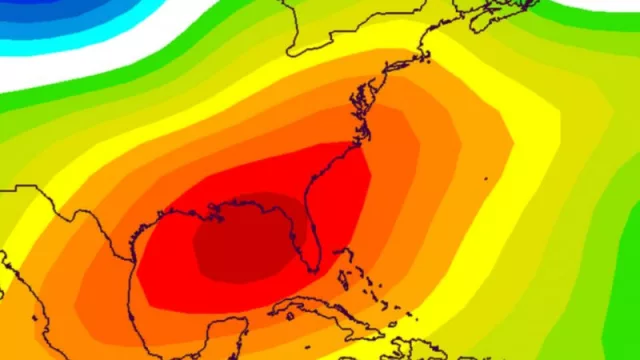This heat record not only affected the United States, where the southern regions have experienced intense heat waves in recent weeks, but also extreme temperatures have been recorded in China, surpassing 35 degrees Celsius, and in North Africa, reaching 50 degrees Celsius.
One aspect that has caught the attention of experts is the situation in Antarctica, which is currently experiencing its austral winter. Despite this, unusually high temperatures have been observed in the region.
Zeke Hausfather, a researcher at Berkeley Earth, has emphasized that this record is just the first of a series that is expected to be set this year due to the increase in carbon emissions and greenhouse gases, combined with an El Niño event, which is driving temperatures to unprecedented levels.
China has also issued warnings about potential "natural disasters" during the month of July due to extreme conditions, including torrential rains and high temperatures. The country has been facing extreme weather conditions in recent months, exacerbated by climate change.
Climate experts have highlighted that the increase in extreme weather conditions, including droughts and rare and deadly climate events, is a cause for concern and underscores the lack of momentum in finding effective solutions. The World Wildlife Fund has expressed concerns about the lack of progress on key issues such as fossil fuels and funding during the recent climate talks in Bonn, Germany.
As preparations for the upcoming United Nations Climate Change Conference (COP28) in Dubai in November continue, experts hope that the reality of these extreme events will drive more decisive action to address climate change. However, some experts doubt that the negotiations will achieve significant progress due to political limitations.
In this regard, Li Shuo, a senior climate advisor at Greenpeace in Beijing, expressed disappointment and emphasized the importance of the reality of these extreme events driving real changes in actions and policies.
The results of the visit by the US Special Presidential Envoy for Climate, John Kerry, to Beijing are eagerly awaited, although there is little hope that this visit will provide a new impetus to climate negotiations. The upcoming actions will be crucial in addressing the urgency of climate change and ensuring a sustainable future for the planet.
It is clear that urgent measures need to be taken to reduce carbon emissions and greenhouse gases. There should also be a willingness to listen to scientists who do not agree that the origin is solely due to CO2 emissions and to evaluate all causes and possible actions to reduce them or to understand if it is a natural phenomenon and a consequence of the planet's evolution. In any case, it is certain that we must work together to achieve measures that are natural, do not restrict individual or collective freedoms, and are based on scientific certainties rather than biased ideologies.
Even in Antarctica, during the austral winter, temperatures have reached unusually high levels. The Vernadsky Research Base in Argentina's islands recently broke its July temperature record, reaching 8.7 degrees Celsius. This phenomenon should not be a cause for celebration but rather a worrisome sign of what is to come, according to climatologist Friederike Otto from the Grantham Institute for Climate Change and the Environment at Imperial College London.
Unfortunately, the goal of keeping global warming below 1.5 degrees Celsius is becoming increasingly out of reach. Despite record-breaking months of heat on land and in the oceans, countries
have not set more ambitious goals. According to the Copernicus Climate Change Service (C3S), the average surface air temperature on the planet has exceeded pre-industrial levels by more than 1.5 degrees Celsius for several days. The World Meteorological Organization predicts a 66% likelihood that the annual average temperature will exceed the 1.5-degree Celsius threshold for at least a full year by 2027.
This temperature increase is not limited to land; it also affects the oceans. The global average sea surface temperature has reached record levels, and the Pacific and Indian Oceans are expected to experience temperatures up to 3 degrees Celsius above normal in October. This situation has serious consequences for marine life and can lead to even more extreme weather conditions, with less wind and rainfall.
If more ambitious goals are not set to combat climate change, the impacts will become increasingly devastating. Experts warn that we are on a worrying path towards a future of extreme weather conditions and irreversible damage to ecosystems and people.
The goal is to raise collective awareness and mobilize society towards a sustainable future. Time is of the essence.












Tu opinión enriquece este artículo: